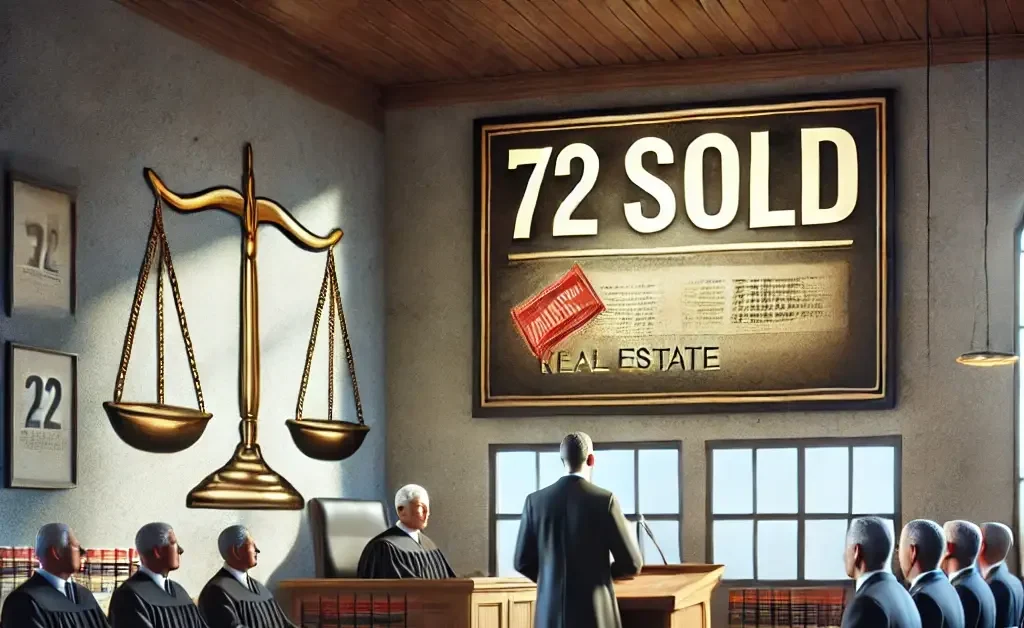Introduction: The 72 Sold Lawsuit – A Deep Dive
The real estate sector has experienced different innovations throughout history, with businesses providing new methods of selling houses fast. 72 Sold is one such business that has been in the limelight due to its quick home sale guarantee. Recent legal controversies, however, have put 72 Sold on the spotlight in the wrong way. The 72 Sold lawsuit has brought to the forefront significant questions regarding the practices of the company and the commitments it makes to home sellers. This article will delve into the specifics of the lawsuit, its implications for sellers, and what the future holds for the company. Do you have any knowledge about Social Media Lawsuit.
What is 72 Sold and How Does It Work?
The concept behind 72 Sold is simple: the company promises sellers that their homes will be sold in just 72 hours, offering a quick and convenient alternative to traditional home-selling methods. Sellers are promised cash offers, a fast closing process, and a seamless transaction with little hassle.
The business asserts that they make the selling of a home easier by bypassing the delays and negotiations present in a typical real estate deal. Instead, they offer a direct path to closing in a matter of days. Although it appears to be a good opportunity for those seeking to sell on short notice, the terms of the offer are now being questioned because of on-going legal cases.
The Allegations in the 72 Sold Lawsuit
The 72 Sold lawsuit is a result of complaints by several homeowners that the company misled them in the selling process. The homeowners complained that the company’s promises were not met, and they are left unsatisfied and financially strapped. Below are the main complaints filed in the lawsuit:
- False Misrepresentation and Advertising: Homeowners allege that 72 Sold promoted an easy, quick cash offer that did not represent the actual deal they were left with. In other instances, the cash offers were lower than anticipated, and some of the sellers believed that the terms were misrepresented.
- Unclear Costs and Fees: The most serious grievance from homeowners concerns surprise fees. Sellers claim they were not fully informed of the different costs involved in the sale, resulting in frustration and confusion when the end price was not as expected.
- Failure to Comply with Agreements: Certain sellers have asserted that the provisions set forth in their agreement with 72 Sold were not respected. Whether the sale price, the timeframe promised, or the conditions agreed upon, homeowners have complained about the company’s inability to meet its obligations.
The Real Cost of Selling with 72 Sold
Although the concept of selling your house within 72 hours sounds enticing, homeowners need to think about how much it will really cost to sell through 72 Sold. For others, the fast sale is too expensive. Homeowners have complained of being blindsided by surprise charges, lower offers, and not knowing what is going on during the selling process.
Sellers usually sign agreements with hopes of getting a good cash offer from the market value. But in a few instances, the offer from 72 Sold was much less than the seller’s desired price, which caused frustration and financial hardship. Besides rock-bottom offers, other homeowners assert that they were not distinctly told what additional fees, such as administrative charges, closing fees, and transaction fees, would be added to the final sale price. All of these ate into the final sale price.
What the Lawsuit Means for 72 Sold
The pending litigation poses a serious threat to 72 Sold, which may impair both its image and future business. If it loses the case, the firm would have to pay substantial financial compensation, such as compensation to homeowners. Additionally, the court battle may compel 72 Sold to re-evaluate its business model and change its methods to make it more open and customer-centric.
Other than the monetary loss, the suit might also besmirch the company’s reputation. If true, the allegations may lead to loss of faith on the part of potential clients who were previously drawn to the possibility of an easy, convenient sale. The loss of confidence might severely damage the company’s position in attracting new sellers and in the marketplace.
Impact on Home Sellers: Is 72 Sold Worth It?
If you are thinking of selling your house through 72 Sold, you might want to think twice about the risks. As enticing as the guarantee of a quick sale is, the pending lawsuit reminds us of the need for openness and clarity of terms before committing to any contract.
Home sellers should be very careful of those companies that guarantee fast solutions without clearly explaining the terms. Carefully read the contract, inquire about any fees, and understand the cash offer upfront. This will save you from any surprise later on.
What to Do if You’ve Already Sold with 72 Sold
If you have already proceeded through the 72 Sold process and are unhappy with the terms or offers, there are a few things you can do:
- Get Legal Advice: If you think that you were deceived or not treated fairly, talking to a real estate lawyer can assist you in figuring out if you have a case and what you can do.
- Consider a Class Action: If the lawsuit becomes a class action, you can join other impacted sellers to recover compensation.
- File a Complaint: You can submit a formal complaint to entities such as the Better Business Bureau (BBB) to heighten the concern and raise awareness of your case.
FAQs
The 72 Sold lawsuit is a complaint alleging that the company deceived homeowners regarding the offers they would receive, as well as did not reveal some fees and charges on the sale of the home.
If you are selling your home through 72 Sold, the lawsuit points out possible problems with surprise fees and ambiguous contract provisions. Make sure you read carefully before signing on.
If you feel that you have been deceived by 72 Sold, you can join the suit, particularly if your situation falls under the complaints of other hurt sellers. Seek the advice of an attorney to determine your alternatives.
If you believe that you have been treated unjustly, think of consulting with legal counsel regarding your situation. Filing a complaint or a class action suit in case may be something you may also consider doing.
Conclusion:
The 72 Sold lawsuit serves as a cautionary tale for homeowners considering this quick-sale option. While the promise of a rapid home sale is tempting, the allegations of misrepresentation, hidden fees, and broken contracts make it essential for sellers to approach the service with caution. Before deciding to sell your home through 72 Sold or any similar service, take the time to thoroughly research the company, understand the terms, and consult with professionals.
In the end, whether or not to go through with 72 Sold will depend on a good knowledge of what the company can and cannot provide. If you are in doubt, consulting a good real estate agent or lawyer will ensure that your home-selling experience is both profitable and fair.
For more information on consumer rights in real estate, you may visit Consumer Financial Protection Bureau.







